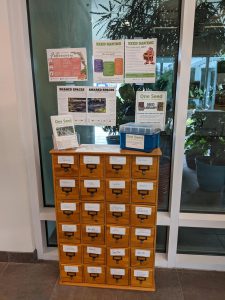
In January, many folks try new habits, hobbies, and take on cleaning projects, too. Let’s talk about all three in relation to seeds. Over time stored seeds may lose their ability to germinate and grow. What do you do if you are clearing out your seed stash and discover you have seeds that need to be used, but you don’t have use for them? Consider bringing them to our seed library located in the lobby of our UF/IFAS Extension Sarasota County at Twin Lakes Park on Clark Rd. This seed library offers opportunity for community members to ‘borrow’ free seeds to plant in their garden. By the same token, some folks bring seeds to the seed library for others to enjoy. Seeds are mostly for edible crops, but native wildflowers and other seeds are welcome as long as they aren’t invasive.
Before cleaning out last season’s veggie plants from your garden- consider if there are seeds you want to save. Saving seeds can save you money, become a fun new hobby, and a new sustainable habit, too. When saving seeds it’s important to make sure they are completely dry before storing them, and its important to label and date them as many seeds look similar and their ‘shelf-life’ can vary, too. Don’t store seeds in hot or sunny areas like your car or areas they can get wet.
To learn more about seed saving:
View the attached flier for Seed Saving Tips
Watch this recorded webinar “Seed Saving for Your Garden”
Explore seed saving in the school garden Explore seed saving in the garden
Learn about seed saving live- catch this topic via webinar today as part of the School Garden Leadership Training Series,
Saving seeds can promote biodiversity. By sharing seeds of crops that grew well for you it offers your neighbors opportunity to explore growing plants favorable to our local climate and conditions. Some seeds shouldn’t be saved and shared especially if they are patented/protected. Seed sales are typically to recoup the cost of years of research dedicated to breeding plants for varieties resistant to certain pests/diseases which can mean less need of chemical controls. Saving and sharing seed of open-pollinated or heirloom seeds can save money making it easier to afford planting a diversity of crops in your garden, and hopefully leave funds available for specialty seed when you need it. A diversity of seeds and crops can make for a beautiful and bountiful garden and encourage some culinary creativity, too.
For upcoming learning opportunities related to edible gardening, look for ‘Shared Spaces’ or ‘One Seed’ in the title, soon to post to our Eventbrite page. Or subscribe to our newsletter about upcoming events/class blast
 1
1
